Be aware of a new scam that has surfaced, offering a free Le Creuset from Kohl’s through a loyalty program. This scam is being spread through emails claiming that the recipient has been chosen to participate in the program for free and all they need to do is confirm their participation. The email states that it will take only a minute to receive the fantastic prize, but in reality, it’s a trap designed to trick unsuspecting victims into giving away their personal information. The scammers behind this scheme are using the well-known brand of Kohl’s and the popular cookware company, Le Creuset, to make their offer seem legitimate. However, the offer is far from real, and users should be cautious of any emails claiming to give away free prizes in exchange for confirming their participation in a loyalty program.

Unfortunately, these types of offers are often part of a larger scam known as a survey scam ( also known as a reward scam and prize scam). In this article, we will explore what a survey scam is, how it works, and how to protect yourself from falling victim to these fraudulent schemes.
QUICK LINKS
- KOHL’S Le Creuset Scam Explained
- How the scam works?
- How to Spot a Survey Scam?
- 8 Tips to Avoid Survey Scams
- Report a Scam
KOHL’S Le Creuset Scam Explained
This is an email-based scam that aims to trick users into giving away their personal information by offering a free Le Creuset cookware product from Kohl’s. The scammers behind this scheme use a fake loyalty program as a guise to collect information from unsuspecting victims. The goal of the scammers is to obtain sensitive information such as names, addresses, email addresses, and potentially even financial information, which they can then use for malicious purposes such as identity theft, fraud, or the sale of the information on the dark web. The use of the well-known brand name of Kohl’s and the popularity of the Le Creuset product makes the offer seem trustworthy, but in reality, it’s a deceptive tactic used to steal personal information.
A KOHL’S Le Creuset Scam Text:
Hurry up. The number of prizes to be won is limited! Confirm Now!
Less Sticking & Burning
Limited Kohl’s Offer
LES PLATS À FOUR
Get it Now!KOHL’S Le Creuset
Congratulations!
You have been chosen to participate in our Loyalty Program for FREE!
CONFIRM NOW!
CREUSET
It will take you only a minute to receive this fantastic prize.. Le Creuset
If you no longer wish to receive these emails, you may unsubscribe by clicking here or by writing to
The advertiser does not manage your subscription.
If you prefer not to receive further communication please unsubscribe here
By providing their personal information, individuals risk suffering financial losses or damage to their credit score. The scammers may also use tactics such as urgency and limited-time offers to pressure individuals into providing their information quickly.
How the scam works
The Kohl’s Le Creuset scam begins with an email claiming that the recipient has been chosen to participate in a loyalty program for a chance to receive a Le Creuset prize for free. The email prompts the recipient to confirm their participation and promises that it will only take a minute.
- The user clicks on the confirmation link in the email, which directs them to a website claiming to be Kohl’s.
- The website asks the user to fill out a form with their personal information, including their credit card details to pay for the shipping fee.
- Once the form is submitted, the user’s credit card is charged for the shipping fee, and the user never receives the promised prize.
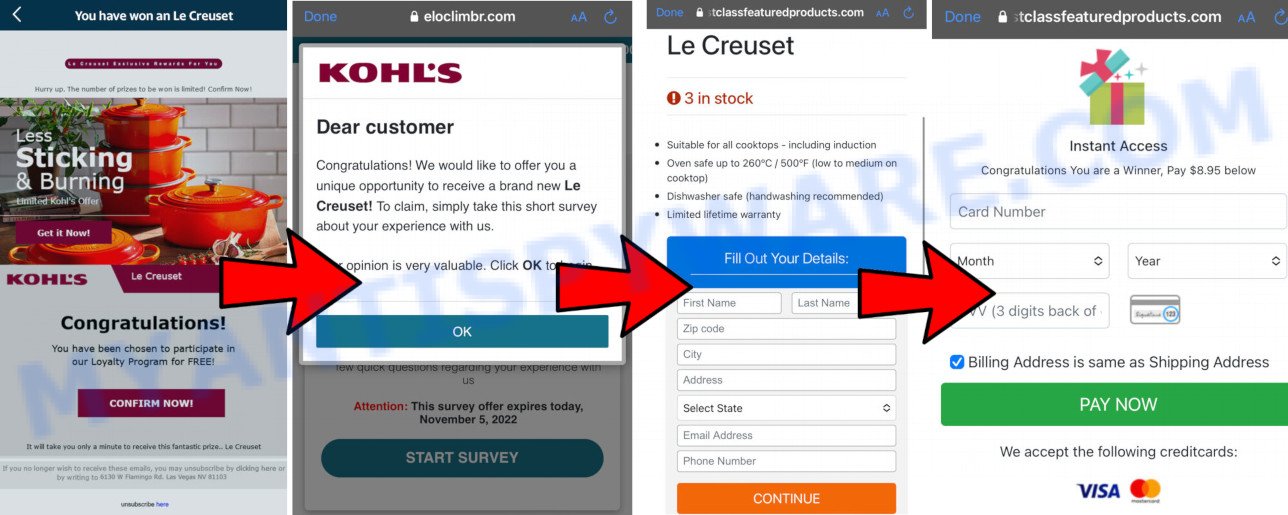
In reality, the scammers are using the user’s credit card information for fraudulent purchases or other malicious purposes. The website and email are not affiliated with Kohl’s, and the promised Le Creuset prize is not legitimate.
Some common examples of such scams
- Free prize giveaways. A user is promised a free prize, such as a gift card or a laptop, in exchange for completing a survey and providing personal information.
- Paid surveys A user is promised payment for completing a survey, but is required to provide personal information, such as their full name, email address, and bank account details, in order to receive payment.
- Vacation packages or travel deals. A user is promised a discount or free vacation package in exchange for completing a survey and providing personal information.
- Online shopping vouchers. A user is promised a discount voucher for an online store, such as Amazon or Walmart, in exchange for completing a survey and providing personal information.
- Free trial offers. A user is promised a free trial of a product, such as a weight-loss supplement, in exchange for completing a survey and providing personal information.
- Work-from-home opportunities. A user is promised a work-from-home opportunity in exchange for completing a survey and providing personal information.
These scams can be found on websites, pop-up ads, or social media platforms. Shein $500 Gift Card Scam, You’ve made the 5-billionth search, CashApp Reward Survey SCAM, 2023 Annual Visitor Survey, $750 Cash App Survey, Chrome search contest 2022 are some of the scams we reported recently.
- Wp20.ru takealot.com scam
- Latitudesxom.com Reward Pending Online Survey Scam
- Orange Survey SCAM
- Keepbonusforwin.life redirects Apple iPhone 13 Pro Scam
- CashApp Reward Survey Scam
How to Spot a Survey Scam?

Here are some red flags to help you spot a survey scam: offers that seem too good to be true, requests for personal information, pressure to act quickly, requests for payment, lack of clear information.
- If a prize or reward being offered is significantly more valuable than what you would normally expect from a survey, it may be a scam.
- Legitimate surveys will typically only ask for basic demographic information, such as your age and gender. If a survey is asking for sensitive information, such as your Social Security number, credit card information, or bank account details, it’s likely a scam.
- Scammers may use tactics such as urgency or limited-time offers to pressure you into providing personal information quickly.
- Suspicious website or email addresses: If the website or email address associated with the survey is not well-established or seems suspicious, it may be a scam.
- Legitimate surveys will never require payment to participate. If a survey is asking for payment, it’s likely a scam.
- If the terms and conditions of the survey are unclear, or if there is no clear explanation of how the information collected will be used, it may be a scam.
By being aware of these red flags and being cautious when providing personal information online, you can protect yourself from survey scams. If you suspect that a survey is a scam, it’s best to avoid it and to report it to the relevant authorities, such as the Federal Trade Commission (FTC) in the US.
8 Tips to Avoid Survey Scams
Here are some tips to help you avoid survey scams:
-
Be cautious of unsolicited offers
If you receive an offer for a survey or prize through an unsolicited email, pop-up ad, or social media message, be wary. Scammers often use these methods to lure people in.
-
Check for legitimacy
Before participating in a survey, check if it is legitimate. Look for information about the company offering the survey, their privacy policy, and any reviews or complaints online.
-
Research the company
Before you participate in a survey, research the company offering it to ensure that it’s a legitimate business. Check their website, look for reviews or complaints online, and verify that they have a privacy policy in place.
-
Read the terms and conditions
Carefully read the terms and conditions of any survey you are considering participating in. Look for any red flags, such as requests for payment or unclear information on how your personal data will be used.
-
Check for related scams
Be aware of related scams, such as those that ask you to pay a fee to receive a reward or those that ask you to provide sensitive information to enter a contest. These are often scams.
-
Limit the personal information you provide
Only provide the minimum amount of personal information necessary to participate in a survey. Avoid providing sensitive information, such as your Social Security number or financial information.
-
Use a secure internet connection
When participating in a survey, make sure to use a secure internet connection, such as one at home or a reputable public Wi-Fi network, to protect your personal information.
-
Be wary of unsolicited emails
Be cautious of unsolicited emails that ask you to take a survey, especially if they contain a link. Scammers may use these emails to phish for your personal information.
By following these tips, you can reduce your risk of falling for a survey scam and protect your personal information from being used for malicious purposes.
Threat Summary
| Name | KOHL’S Le Creuset Scam |
| Type | Survey Scam, Phishing, Social Engineering |
| Fake Claims | Hurry up. The number of prizes to be won is limited!; Congratulations! You have been chosen to participate in our Loyalty Program for FREE! It will take you only a minute to receive this fantastic prize.. Le Creuset; If you no longer wish to receive these emails, you may unsubscribe by clicking here |
| Damage | personal information theft, financial loss, malware infection (some survey scams may include links or downloads that contain malware), privacy invasion |
| Distribution methods | spam emails, online ads, social media, fake websites, text messages, adware |
| Removal | If you are constantly encountering survey scams, it may be due to adware or rogue ad networks. To stop them from appearing, you can use free malware removal tools and scan your device for malware |
Report a Scam
If you encounter the KOHL’S Le Creuset Scam on a website or social media platform, report it as comment on this article. This helps us to warn users about current scams, monitor trends and disrupt scams where possible.
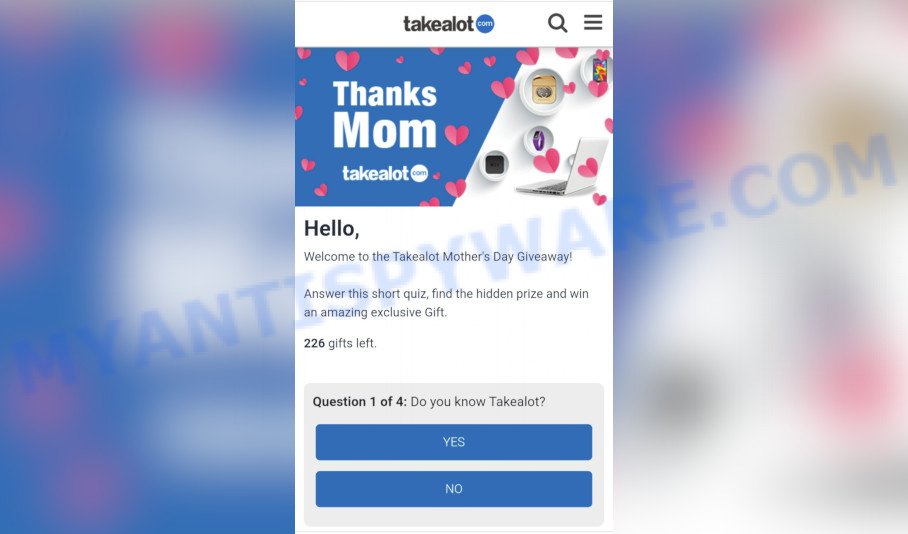
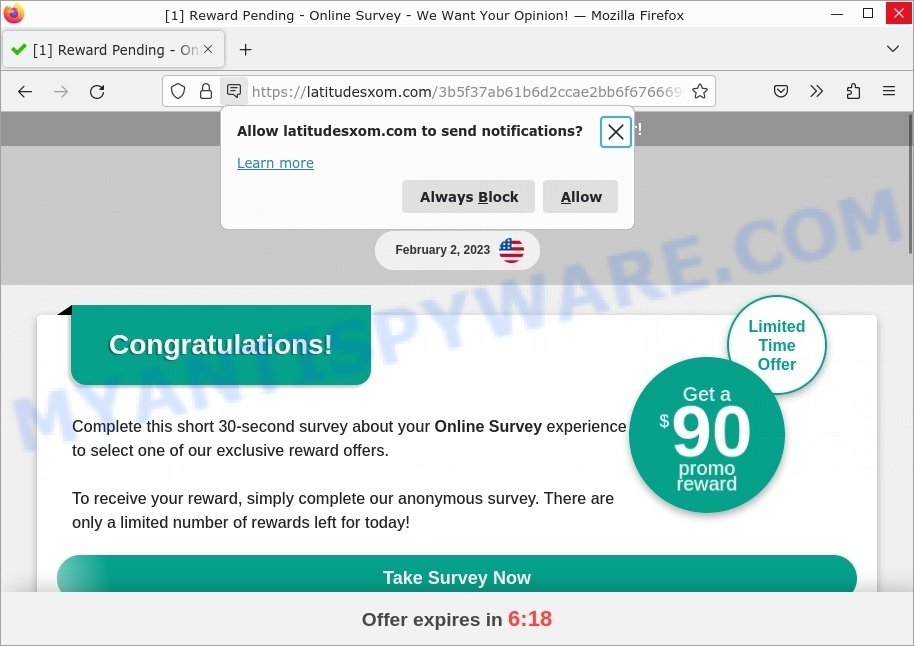
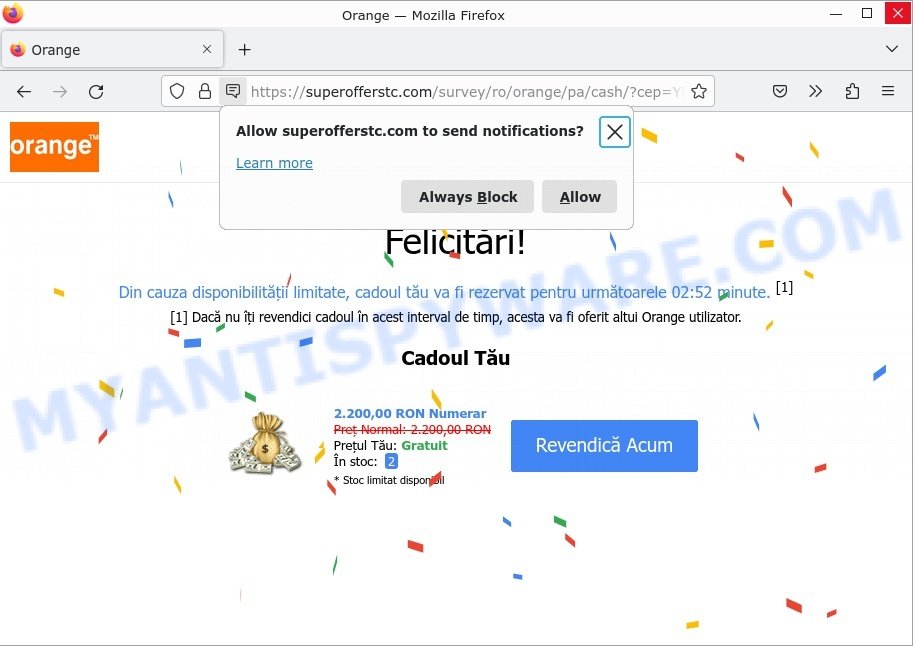
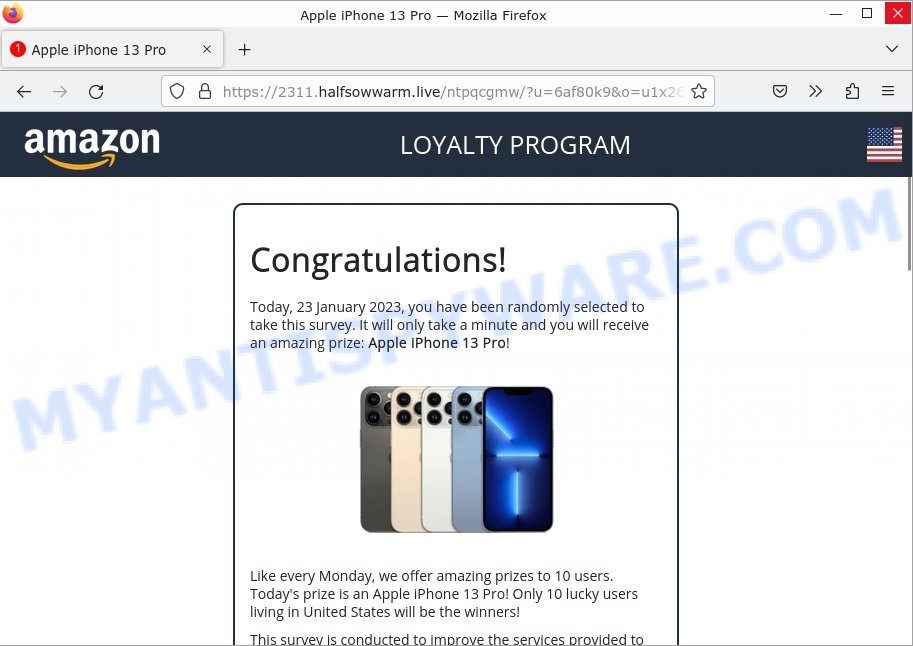
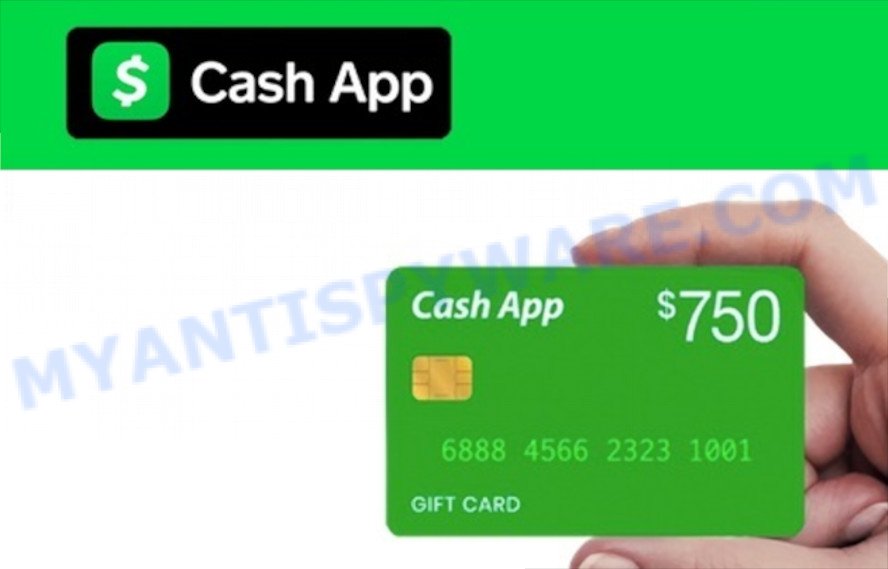


















What is the email address to forward phishing scam spams to Kohl’s? I hope they care if criminals are impersonating them.
Kohls doesn’t seem to have such an address
The KOHL’S scam is currently on Facebook
I received scam email
I have received a number of these emails and keep reporting them to the UK government phishing site. I would like the company themselves to try and take these sites down as they seem to originate in USA.
I received this scam email from address: s6Q1g4Z9y4@lvnztjwuls.artemano.ca the email even provides a mailing address to write them if you wish to unsubscribe from emails, address: 826 Expressway Lane, Spanish Fork, UT 84660. I looked it up & it’s not affiliated with KOHL’S.
Yep, I received the Kohl’s Le Creuset scam via email. All phone #s associated w/ this scam puts you on hold and says wait time is less than 2 min but then proceeds to leave you on hold for much longer than 2 min. It also gives the option to leave a callback # for them to call you back. I doubt they would be calling you back.
freklimi@mail2.hpctota.cn.com
Spam email sent from this address.
Le Creuset set for FREE ???
I almost fell for it as it was compelling but my Antenae went up!
Sneaky SCAM Phishing emails – FThem
Cannot Believe KOHLS could care less about their customers being scammed by these impersonators!
They SHOULD take this VERY seriously
I just now registered for this type post on instagram and gave my personal info n card details I m scared now please help wt to do to not misuse card details please anyone kindly please let me know to be safe from this scam
What should you do if you fell for the scam (it was on facebook)?
Asking for a friend
I ordered one because I’m stupid!!!!
Le Creuset Cookware-KOHL’s scammed me
Yes, I was looking for Le Creuset cheaper and found a Facebook site saying Kohl’s had a special survey – answer a few questions and you could win a whole set for $6.99. I was stupid and tried numbers for two cards. Now I’m going to call and get new cards. Seems to be my only option.
I also got scammed. It came up as a charge for game fit. I was trying to get my daughter some cookware cheap and fell for it. I guess I will head to the bank!
received an e mail from le Creuset thanking me for my order. I DID NOT ORDER ANY THINK FROM LE CREUSET. THE E MAIL THANKED ME FOR MY ORDER. PICTURES OF TWO LE CREUSET BRAISER S WERE ON TH PAGE. …. THE EMAIL IS AS FOLLOWS: Thank you for your recent purchase. Your opinion matters to us and other customers. We would love if you would share your review!
At the bottom of the email was ”
Need to contact us directly?
Call 877-273-8738 or visit https://www.lecreuset.comcontact
More information followed. Shop. Specials Our Colors. Our Materials Find a Store. Gift Registry
The message said I was receiving this email because I had subscribed at the web site. I DID NOT. IN MARCH CREDIT CARD WAS CHARGED FOR TWO PURCHASES I DID NOT MAKE. MY CREDIT CARD COMPANY DID INVESTIGATE AND THE CHARGES WERE DELETED. SCARY THAT I RECEIVED THIS EMAIL YESTERDAY……I called several phone number that are listed for the company on the internet and in the email received. … today is Saturday and all the numbers that I called did indicate that the numbers were for Le Creuset and to call back Monday. 8 am to 5pm. SCARY…..
i want more information
I am on hold with my credit card company to file a fraud claim. Third party vendor refuses to give any information on contacting the company charging the account.
I received a pop up add stating take this survey and see if you’re a winner. OFCOURSE i won….but I always verify everything before I give any info which is what brought me here! Le Creuset Cookware Survey! Promotional Product.com Thank God my son taught me that if it seems too good to be true…It probably is!! It takes an EVIL person to try to scam people right now with all of our problems with the Economy the way it is!!! Be safe People and always VERIFY!!! I would like to leave my address and invite the scammer over for a special dinner at my house!! Just a sweet 55 yr old Grandmother being grateful and wanting to cook a thank you dinner! LOL